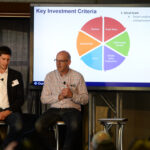Steve Hansen’s leadership masterclass
Dr Mike Ashby shares the lessons from the All Blacks coach’s winning approach to business…
Dr Mike Ashby shares the lessons from the All Blacks coach’s winning approach to business management and leadership.
After all the Rugby World Cup hype and hoopla last year, many of us have now put it to the backs of our minds. Of course, if we’d lost we’d still be talking about it (like the quarter-final loss in 2007!)
I know we all understand what an exceptional job Steve Hansen has done, but what I really want to focus on is his astuteness as a leader because his principles and practices were a masterclass in management and leadership.
When he took over the company – sorry, team – he immediately set an unthinkable goal. He went to the leaders and said “let’s do something no one else has done before: we’ve got the opportunity to be the most dominant side in rugby history” and he invited them to join the adventure. He provided a strategic focus in the form of achieving the merely possible but unprecedented (winning back-to-back World Cups).
He didn’t talk about it in public, but senior players were well aware of the goal.
Do you have an unthinkable goal for your company? Do you talk to your team about it? Do you and they know what the path to the goal is?
The next thing Hansen did was establish a management team. He noted in an interview that for a long time leadership among the players had been through a leadership group, and he thought the same should apply to management (there were 20 management personnel accompanying the 31 players in England). Within that management team, there was the “sweet spot”, the senior leadership group of Ian Foster (coaching), Darren Shand (logistics) and Gilbert Enoka (well-being).
There’s another interesting thing: they had someone on the senior leadership team responsible for well-being, but he was not a physician: he was the guy who worked to get the players to peak mental performance, because in the end, the ability of this team to dominate the last ten minutes was a combination of their superb physical and mental fitness.
What do you do to ensure your team are working at their peak mental performance?
Hansen said of this group, “I think it’s massive because it gives you four keepers of the team. You throw your player leadership group in there and that’s your pillars.” All the indications are that Hansen runs a genuinely inclusive leadership group, that they do indeed make decisions together. They run their individual areas, and he has oversight of the whole, but his special role is to make that group work.
Do you share your leadership?
The leadership group enabled Hansen to focus on the big picture: where the game was going, what the competition were doing and how the team needed to evolve its strategies and tactics. He never let the team get comfortable, constantly pushing them for better performance.
He developed a vision for the “triple threat” attacking game where the All Blacks can pass, run and kick with equal skill and intensity. Honing the skills meant that they could play any team in any conditions.
Where is your market going to be in two years and how will you be in a position to compete?
It also enabled him to stamp his coaching style on the team. Everyone in this team talks about focusing on process not results. He has instilled a deep belief that if they execute the core processes with full focus, the results will come.
“Our job is to make the complex simple,” Hansen says. “The simpler you can make it for somebody, the easier it is to do it.” I think that’s just a wonderful statement of leadership – not just because the concept of making things simple is so elegant, but also because of his self-awareness about his primary role.
What do you see as your job as leader?
Finally, Hansen worked hard to set the culture, because culture breeds commitment, teamwork and the willingness to dig deep. A healthy culture sets the tone for people coming in: good coaches set the tone which senior players adhere to, and it becomes the norm for new players coming in: this is how the world’s best team operates.
Are you proud of the culture your new staff members encounter?
I always enjoy Steve Hansen’s interviews. I hope that when he retires he’ll write a book about coaching and what he has learned. The issue will be whether to classify the book under sport, psychology or business leadership.


